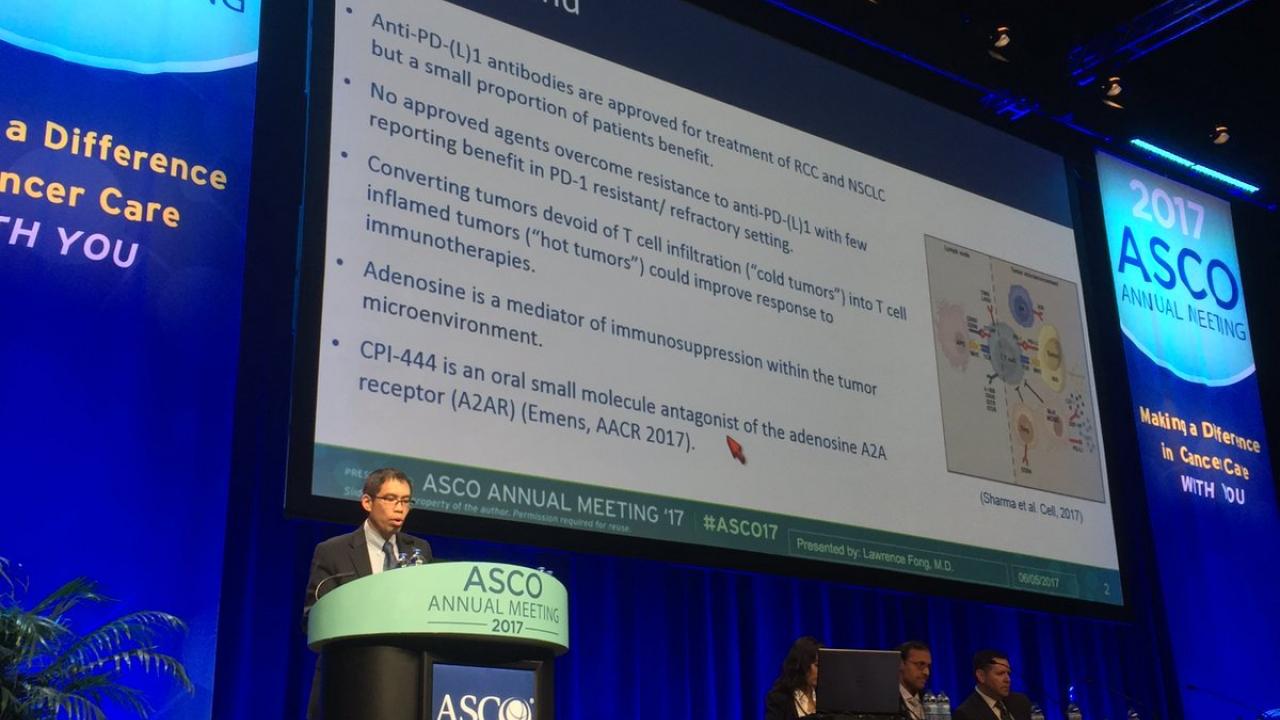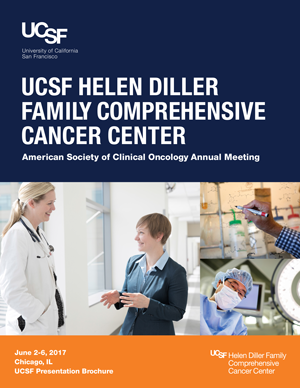
UCSF had an impressive presence at this year's annual meeting of the American Society of Clinical Oncologists (ASCO) in Chicago. One of the world’s most prestigious gatherings of oncology professionals, ASCO 2017 drew more than 40,000 cancer experts focusing on groundbreaking research and advances in cancer.
Honors and Awards
- Hope Rugo, MD inducted as 2017 ASCO Fellow
- David Oh, MD, PhD and Melissa Wong, MD received 2017 Young Investigator Awards
Through keynotes, panels, posters, and discussions, HDFCCC members and junior faculty presented a range of cancer research from UCSF.
Sixty of the HDFCCC’s 400+ members were represented in abstracts accepted for presentation.
ASCO provides investigators of all levels a chance to present and review research, confer with colleagues, and return with new ideas.
 Featured Presentation: Erin Van Blarigan, ScD presented data on the impact of diet and exercise on colon cancer recurrence which was one of just six abstracts out of the 5,000 submitted to be featured in the prestigious press program.
Featured Presentation: Erin Van Blarigan, ScD presented data on the impact of diet and exercise on colon cancer recurrence which was one of just six abstracts out of the 5,000 submitted to be featured in the prestigious press program.
Van Blarigan's research found that colon cancer patients who have a healthy body weight, exercise regularly, and eat a diet high in whole grains, fruits, and vegetables have a significantly lower risk of cancer recurrence or death.
On Twitter
Twitter usage at ASCO has grown dramatically since 2011, demonstrating the increasing role of social media in the dissemination of findings at conferences.
Over 17,000 individual accounts posted over 90,000 tweets with the hashtag #ASCO17 during the conference, an average of almost 800 per hour. Many investigators used twitter to confer with colleagues in real time during presentations.

Online news channels such as @onclive, @oncologytube, and @ascopost conducted interviews with industry experts specifically for distribution on social media due to the large volume of traffic.
For a birds-eye view of UCSF at ASCO from @UCSFCancer, take a peek at our Storify page.
Highlights on the Science
We asked a few members to share their thoughts on noteworthy presentations this year.
Cutaneous Cancers
Adil Daud, MD, director of melanoma clinical research at the HDFCCC, gives credit to fellow UCSF Parker Institute for Cancer Immunotherapy member and first author James Lee, MD, while discussing findings that melanoma patients with liver metastases do not respond as well to anti-PD-1 immunotherapy agents. This suggests that where cancer metastasizes plays a role in response to immunotherapy treatment.Hematological Malignancies
 Tom Martin, MD, Associate Director of the UCSF Multiple Myeloma Program, took a moment to convey his enthusiasm about the posters on plasma-related disorders. “We have some exciting things at ASCO, first and foremost the amount of therapeutics that are available for relapsed and refractory multiple myeloma.”
Tom Martin, MD, Associate Director of the UCSF Multiple Myeloma Program, took a moment to convey his enthusiasm about the posters on plasma-related disorders. “We have some exciting things at ASCO, first and foremost the amount of therapeutics that are available for relapsed and refractory multiple myeloma.”
Victoria Wang, MD, reviewed the status of accrual for UCSF investigator-initiated Cy-Fi trial for patients who have relapse with Acute Myeloid Leukemia (AML). Dr. Wang extended her appreciation to all those contributing to the trial’s success. Ten posters were presented from UCSF authors on hematological malignancies.

Dr. Nina Shah and her former mentor, Dr. Elizabeth J. Shpall of MD Anderson Cancer Center discuss the importance of mentorship for women and the opportunity ASCO provides for collaboration and support.
Nina Shah, MD: "For multiple myeloma there were several exciting reports of immunotherapy targeting the BCMA protein. Two abstracts detailed early clinical trial results of BCMA chimeric antigen receptor (CAR)-T cells for relapsed/refractory multiple myeloma. Fan et al (Legend Biotech) reported a 100% overall response rate (ORR) and 95% complete response (CR) rate for their BCMA CAR-T product with only 2 cases of grade 3-4 cytokine release syndrome (CRS).
Berdeja et al reported on a different BCMA CAR-T cell product (Bluebird Bio), showing 100% ORR and 27% CR in their active dose cohort (> 15 x 10^7 cells) with 13% grade 3 CRS. Though follow-up is short for both, these results are promising in this difficult-to-treat patient population."
Breast Cancers
Laura Esserman, MD, MBA, director of the UCSF Carol Franc Buck Breast Care Center and co-leader of the Breast Oncology Program, noted several important takeaways from the meeting on breast cancer care and research.
 "First, patient-reported outcomes can be used for tracking and triaging services for symptom relief in the setting of metastatic disease, and it improves survival.
"First, patient-reported outcomes can be used for tracking and triaging services for symptom relief in the setting of metastatic disease, and it improves survival.
Second, multi-thousand-person adjuvant trials are not the solution to understanding who needs targeted new treatments. The likely answer is that we need to focus on response in individuals, using early endpoints and figure out who the super responders are, minimize the amount of treatment, and sequentially add treatments as people need it - before metastatic disease occurs. This is likely the best path forward for testing and promoting personalized medicine.
Third, immune check point inhibitors are here to stay and will play an important role in cancer treatment going forward, especially in early aggressive breast cancer. And lastly, circulating DNA continues to evolve and is closer to being an early endpoint to measure response across many cancers. "
Therapeutics
Sue Yom, MD, PhD offered her thoughts on proton therapy. "Clinical trials for proton therapy will be maturing over the next few years. Any potential benefits will accrue from quality of life improvements and increased ability to provide re-irradiation for previously radiated patients.
The financial commitment for proton therapy is large at present, and private financing runs the risks of conflicts of interest and high cost debt servicing. Prices are expected to decrease as the technology evolves.
The absolute need for proton therapy is 5% of the radiation oncology population. However, in head and neck cancer, European research using rational model-based selection estimates that up to 30-40% of the population will benefit."
 For more detail on presentations by HDFCCC members, download the report.
For more detail on presentations by HDFCCC members, download the report.


